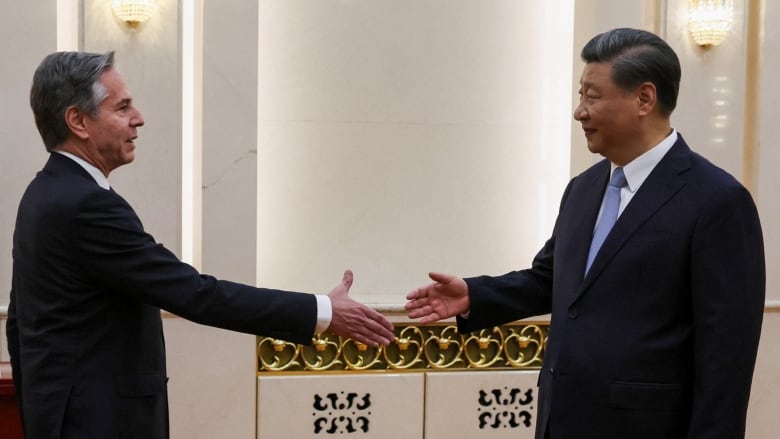Diplomatic ceasefire next to the Great Wall of China
Washington: We do not support Taiwan’s independence
According to Iran Gate’s report, the US Secretary of State, Anthony Blinken, has made the highest-level government visit to China since President Joe Biden took office. Xi Jinping, the Chinese President, evaluated this meeting and dialogue very positively, stating that both sides have made progress and reached agreements on certain specific issues. This unexpected meeting has brought diplomatic missions between the United States and China to a peak.
According to Chinese media, this meeting lasted about half an hour and led to the emergence of openings between the two countries. According to official reports from Chinese media, Xi Jinping announced after the conversation with Blinken that the Chinese side has clarified its position, and both sides have agreed to follow up on the understandings reached with President Biden on the sidelines of the G20 Summit in Bali.
Xi Jinping said that we hope both sides converge on a sustainable relationship and urged the United States to adopt a rational approach and act responsibly. Xi Jinping emphasized that progress has been made and common ground has been reached on certain specific issues, which he evaluated as a very positive development. He expressed hope that Secretary of State Blinken’s visit will have a positive outcome in consolidating relations between China and the United States.
Blinken responded by stating that maintaining bilateral relations is the responsibility of both China and the United States, a commitment that will be respected by the US government. He then declared that Washington supports the One China principle and considers Taiwan an inseparable part of China’s territory. The US Secretary of State expressed concerns about provocative actions in the Taiwan Strait, as well as in Xinjiang, Tibet, and Hong Kong, stating that there are many issues on which we deeply disagree.
Regarding the war between Russia and Ukraine, Blinken has received assurances that Beijing claims it will not give weapons to Russia. The Foreign Minister added that we have not yet found any evidence contradicting Beijing’s claim. However, what still concerns us is the possibility of Chinese companies supplying technology to Russia, which could be used for further aggression against Ukraine. We have asked the Chinese government to be very vigilant about this matter.
China, which declares itself neutral in the conflict, demands respect for the principle of state sovereignty, including Ukraine’s. However, it has never openly condemned Russia’s aggression. Before meeting with Xi, Blinken first met with the Foreign Minister, Wang Yi, and then with Wang Yi, the head of the Central Committee’s Office of Foreign Relations of the Communist Party of China.
China has no intention of compromising with the United States on the issue of Taiwan.
Blinken is the first high-ranking US diplomat who has traveled to this country in the past five years amidst the cold atmosphere of bilateral relations and a not-so-positive outlook for resolving a long list of disputes between the two world’s major economies. After delaying his trip in February due to a Chinese spy balloon flying over US airspace, Blinken, the highest-ranking US government official to visit China since President Joe Biden took office in January 2021, has finally made the trip.
The meetings between the US Secretary of State and Chinese officials did not take place in friendly conditions and tone. During his meeting with Wang Yi, the Chinese Foreign Minister emphasized to Blinken that Beijing will not make any compromises on the issue of Taiwan.
Furthermore, Wang told Blinken that maintaining national unity is always at the center of China’s core interests, and Beijing will not give any concessions on this matter. He added that China and the US must choose between cooperation and confrontation. According to China’s state television CCTV, Wang told Blinken that it is necessary to choose between dialogue or confrontation, and cooperation or conflict.
China’s Foreign Minister, Wang Yi, welcomed Blinken and his team at the entrance of the government guesthouse in Beijing. Before losing themselves in front of the Chinese and American flags, the two exchanged a few words in English. Once inside the meeting room, neither Blinken nor Wang spoke to the reporters who had permission to attend the session, nor did they express any opinions. However, later on, the US State Department announced that the discussions were explicit, substantive, and constructive, and that China’s Foreign Minister had accepted Antony Blinken’s invitation to visit Washington. Wang Yi intends to travel to the US after the Beijing talks.
The main topic of the negotiations between the two sides remains Taiwan, a subject that the Beijing Foreign Minister emphasized in the discussions. According to him, the Taiwan issue is the focal point of China’s fundamental interests and the most sensitive topic in China-US relations, as well as the most significant threat to these relations.
State-owned network CCTV reported that China is asking the US to respect the One China principle and implement the commitment not to support Taiwan’s independence.
On Saturday, June 17, Biden said he hopes to meet with President Xi Jinping in the coming months. The meeting between the two leaders was planned for November on the island of Bali in Indonesia, and it temporarily reduced concerns about a new cold war. However, after the incident involving a Chinese spy balloon flying over US airspace, high-level communications between the two countries significantly decreased.
Most world leaders and governments closely followed Blinken’s trip because any escalation of tensions between superpowers can have global implications on all aspects of international affairs, from financial markets to trade routes and global supply chains.
A senior official from the Ministry of Foreign Affairs, during a fuel stop in Tokyo on the way from Beijing, told reporters that both the American and Chinese sides feel the need for high-level communication channels. The official further added, ‘We are at a critical point in our relationship and believe that reducing the risk of miscalculations or, as our Chinese friends often say, preventing negative spirals, is very important.’
The relations between countries around the world are deteriorating, and there are concerns that the United States and China may eventually clash over the self-governing island of Taiwan, which China claims as its own renegade island. This American official further stated that it cannot be denied that both countries have differences of opinion on various issues, ranging from trade to the United States’ efforts to contain China’s semiconductor industry, as well as Beijing’s human rights record.
McMaster’s trip to China highlights America’s weakness
It is worth mentioning that McMaster’s visit to Beijing also has critics, including Herbert Raymond McMaster, former National Security Advisor to the United States. McMaster, a retired American general who served as National Security Advisor to the country from 2017 to 2018 under former President Donald Trump, stated in an interview with the Face the Nation program on CBS television, ‘I think China is sending such a message to the West and the United States. Look, we are now in charge, your era is over.’
The former US National Security Advisor stated, therefore I believe that such a firm response is required from us, but the trip of Antony Blinken, the US Secretary of State, to China indicates a slight weakness. He further stated that China hopes to create such insight and understanding with Blinken’s visit, that we travel to this country to show respect for the Communist Party of China because in reality, the Chinese want to use their power against the US to make regional countries perceive that it is time to follow us. This is our era and age, and this is what the Chinese refer to as the new era of international relations.
He also stated that US relations with China are worse than US relations with Russia during the Cold War, saying that Washington’s relations with Beijing are worse than its relations with Moscow during the Cold War because our economies are intertwined and interconnected. Another reason is that the leader of the Chinese Communist Party wants to show China to everyone as a country at the center, just as he sees it.
Some experts and analysts believe that we should not expect significant results from this trip. Jessica Chen Weiss, a China and East Asia studies expert at Cornell University, said that she does not expect major advancements from this trip. She mentioned that given the current levels of mistrust and tension in the relationship, it is unlikely to lead to any breakthroughs or address concerns and red lines from both sides. Additionally, there has been limited progress in areas such as the economy and climate change.
Jonathan Ward, author of the book ‘China’s Vision of Victory,’ believes that the state of US-China relations indicates a dangerous future ahead. He said, ‘I don’t think these trips will change the structural problem in US-China relations.’
According to some experts, it is expected that Blinken’s trip will pave the way for more bilateral meetings in the coming months, including potential visits by Treasury Secretary Janet Yellen and Commerce Secretary Gina Raimondo. It may also set the stage for meetings between Xi Jinping and Joe Biden at multilateral summits later this year.
However, it remains to be seen how President Joe Biden’s strange remarks on June 20th about his Chinese counterpart Xi Jinping being a dictator will exactly impact the bilateral relations between Washington and Beijing. This statement came just one day after Secretary of State Antony Blinken’s visit to China to solidify the two countries’ relations.
English
View this article in English


